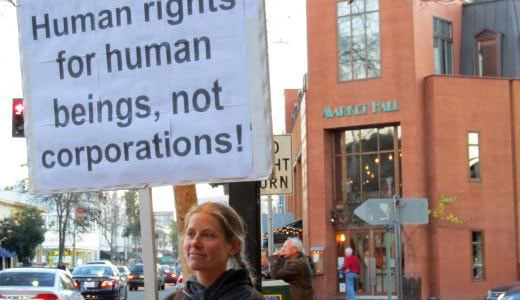
Recently, Attorney General Eric Holder declared the biggest “too-big-to-fail” banks are too big to prosecute. These are banks, and bankers, whose failure precipitated the 2008 financial crisis, and the succeeding depression and bailouts. There have been bailouts, but, so far, no prosecutions of the CEO’s of Bank of America, Wells Fargo, and Countrywide because they are simply too big to fail, without wreaking serious harm to the real economy.
Here are his actual words: “I am concerned that the size of some of these institutions becomes so large that it does become difficult for us to prosecute them when we are hit with indications that if you do prosecute, if you do bring a criminal charge, it will have a negative impact on the national economy, perhaps even the world economy.”
He continued: “And I think that is a function of the fact that some of these institutions have become too large.”
Of course this “too-big-to-prosecute” status transforms last year’s Citizens United “corporations are people” decision by the scoundrel-Scalia-led Supreme Court from farce to horror. Corporate interests can not only anonymously spend as much money as they want on politics (buy as many politicians as will be bought), but also stand largely outside the laws that apply to ordinary persons. Reasonable people might ask: is it possible to exaggerate the anti-democratic threat posed by the vast overreach of corporate power over our democracy? None of the chief culprits whose criminal activity contributed to the financial crisis can be held accountable.
Maybe the contradiction between citizenship and unaccountable lawlessness finds some twisted unity in the “makers and takers” mentality of Mitt Romney and his investor class buddies. But to most people – it’s a farce so gross and objectionable, so laced with indignity and hypocrisy, that it hurts to laugh: like the movie “Dumb and Dumberer,” but now real life!
What explains this contradiction? In every era of the development of capitalism the public sector has assumed a greater and greater role in initiating and providing many of the infrastructure requirements and accommodations that new technologies, new social classes and new divisions of labor demand. In particular, developing human capital resources to the maximum possible is each generation’s best contribution to the possibility of reproducing life on a higher level: a noble social value and political ideal.
The lawless too-big-to-fail phenomenon is, in one sense, both a testament to and repudiation of the most robust aspect of 20th Century industrialization in the United States – its mastery and application of automated systems to generate huge economies of scale in many products and services with fewer and fewer workers per unit of production. Combined with globalization’s vast expansion of markets, economies of scale have created behemoth corporate entities that overwhelm – some say simply capture and nullify – public regulatory control and virtually nullify any public interest policy that conflicts with the private owners profit maximization goals. In addition, the fact that the returns to rising worker productivity are going ever more disproportionately to capital aggravates the difficulties of getting out of this depression without truly extraordinary measures.
One cannot say that this is really a new problem. Corporate assaults on the expansion of social welfare and democracy arising from the social and political upheavals of the 1930’s, 1940’s and 1960’s have been unending. Ever since the New Deal, Civil Rights and Great Society protections were enacted, corporate and wealthy forces have plotted their demise and extinction as encroachments on the domain of private capital and wealth – despite the fact that these improvements actually increased and improved capitalism’s ability to reproduce itself at a higher technological and economic level.
The growing concentration of wealth of these giant firms and their dominant owners, their “lawless citizenship”, and their too-big-to-fail scale in many areas of the economy have allowed them to capture national power repeatedly since Ronald Reagan. The dismantling of hard-won rights has had an effect opposite what was proclaimed – sustained riches for the one percent – stagnation and poverty for the 99 percent, plus tanking the entire economy.
There is only one place where this power can be reversed – at the grassroots. 2014 presents all movements with a new opportunity to: a) strengthen their unity; b) turn back the ultra-right takeover of state legislatures and governors; c) develop credible campaigns for office; d) focus on how to govern from the left; e) win towns, cities, counties, states to encourage collective bargaining for all workers; f) mobilize support for critical education and job creation initiatives; g) pass the expansion of Medicaid in every state; h) start making Obamacare fulfill its promise of universal coverage; h) raise the minimum wage.
In general our goals throughout the working-class movement must be to win the right to lead! Unite working people. Divide healthy from unhealthy business interests. WIN!
Photo: Marilyn Bechtel/PW

MOST POPULAR TODAY

High Court essentially bans demonstrations, freedom of assembly in Deep South

Zionist organizations leading campaign to stop ceasefire resolutions in D.C. area

U.S. imperialism’s ‘ironclad’ support for Israel increases fascist danger at home


UN warns that Israel is still blocking humanitarian aid to Gaza






Comments